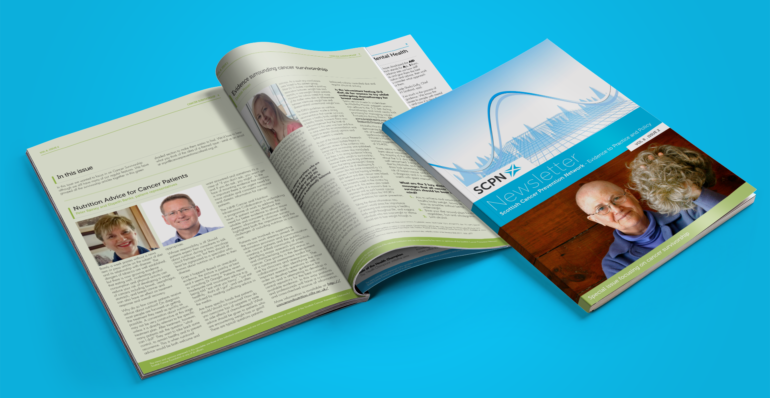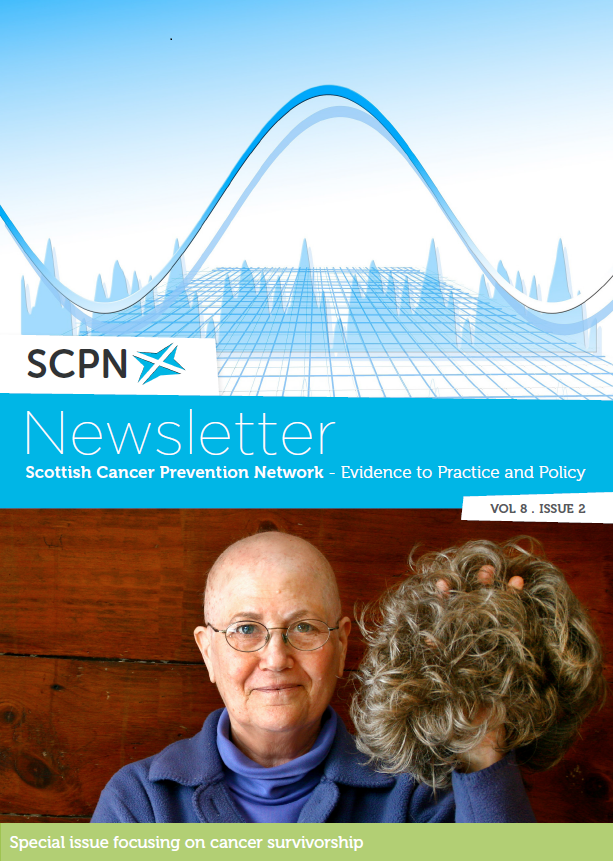
The SCPN Newsletter: Volume 8, Issue 2

01 May 17 |
In this issue
In this issue we wanted to focus in on Cancer Survivorship although we still have many of our regular features. We have grouped all the survivorship articles together in this green shaded section to make them easier to find. We’d love to hear what you think of the idea of a themed issue – send us an email.
Editorial
We are often asked if talking about cancer prevention and lifestyle to people living with and beyond cancer is relevant. To be honest, when we say prevention we really mean risk reduction or “stacking the odds against occurrence and recurrence”. Patients may be offered drugs to reduce the risk of recurrence but how often are they offered lifestyle programmes?
There is now a robust evidence base that shows that interventions can impact on quality of life, wellbeing, reduced risk (or better management) of co-morbidities like diabetes and cardiovascular disease (which may arise as a late treatment effect) and might just reduce risk of recurrence. Is it a duty of care of clinicians to offer brief interventions, endorse activity and healthy eating programmes, and pass on practical information on where to get advice and support? As Elspeth Banks and Peter Rainey highlight in their article, it seems many patients revert to Dr Google and patients report inadequate and inconsistent advice. The question then arises: whose responsibility is it to give lifestyle advice?
So many patients wish to return to normal life… to regain weight and to eat and drink in ways that are familiar and certainly not to feel guilty about enjoying “hearty eating”. Indeed, they may have been told in hospital to eat anything and everything they like… as long as they eat, don’t worry about what it is.
In the TreatWELL study the Clinical Nurse Specialists listened hard – the idea that maybe we should think of diet quality as well as quantity came as a bit of a surprise, especially when we saw the printed guidance which encourages pies, sausage rolls, cakes, pastries and sweeties as basic diet items.
Years ago, many cancer patients presented with weight loss as a key symptom; now with screening and earlier diagnosis it is more likely that people are overweight which means poorer outcomes. The aim of post treatment lifestyle programmes should be to help build resilience to future disease by increasing the proportion of muscle mass (helped by regular and adequate physical activity) and decreasing body fat (by avoiding excess calorie intake).
More research needed, more action needed and more responsibility by the cancer community needed now.
This article was originally published in The SCPN Newsletter Volume 8, Issue 2. Read the digital newsletter below using Issuu, or feel free to download the PDF.
View the PDF

The SCPN Newsletter: Volume 8, Issue 2
In this issue we have a section focusing on cancer survivorship as well as our regular features - examples of good practice, public health initiatives, recipes and interesting studies which contribute to the body of evidence on cancer prevention.